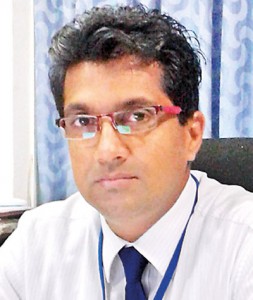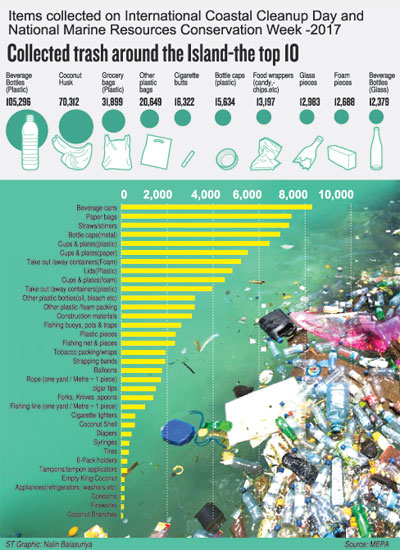News
Sea of trash: Inland and overseas garbage washes up on Lanka’s beaches
The mounting coastal litter along Colombo’s coastal belt and other tourist areas of the country is increasingly becoming breeding grounds for dengue.

Mattakkuliya: Littered coastal belt. Pix courtesy Marine Environmental Protection Authority
From plastic bottles to electrical appliances, the list of what ends up along the coast as litter is endless. While tiny particles of discarded plastics (the micro plastic) are destroying marine life, the mounting non-degradable waste tarnishes the country’s image as a tourist paradise.
The Maritime Environment Protection Authority’s (MEPA) spent millions of rupees on coastal cleanups last year — a reflection of “spending public money for public waste,” as the MEPA’s General Manager and CEO, Dr. Terney Pradeep Kumara, puts it.
A large proportion of the problem is attributable to inland waste, he notes. “It is not merely what is dumped directly on the beaches, but all that flows through canals and rivers,” he says, pointing out that other triggers, including the fisheries and the tourism sector, are only secondary to inland waste which ends up on the coast.
Added to the burden is the garbage which flows from India, Indonesia and Thailand, he says. The MEPA’s role in controlling pollution covers Sri Lanka’s 1640 km coastal belt and extends up to 200 nautical miles to the deep sea, the area, which, according to Dr. Pradeep Kumara, is eight times the size of Sri Lanka’s land area.
The garbage dumped in the coastal vegetation is contributing to the dengue problem and the situation calls for urgent public awareness, says the MEPA’s GM. “The dengue cleanups are largely inland-focused and there should be a shift to coastal waste as well, especially the fishing craft, both in use and abandoned, in which water is stagnated.”
Calling for legislative reforms to address human-induced coastal waste, Dr. Pradeep Kumara points out that the present laws governing coastal pollution are still largely shipping-waste oriented. “The Marine Environment Protection Act does not recognise a layered fine system ranging from the average individual polluter to the large industries,” he says. The MEPA is proposing amendments to the Act to fill the lacuna.

Dr. Pradeep Kumara
Mitigating inland pollution is seen by MEPA authorities as the first step in realising cleaner beaches. They moot a site-specific garbage disposal system, as opposed to a ‘blanket system’. “What works for Colombo will not work for other areas,” says Dr. Pradeep Kumara.
The waste audits done by MEPA reveal plastic to be the highest pollutant. Along with an effective network of recycling centres, a mechanism to collect the plastic by the producers themselves is also proposed by MEPA. This measure can bridge the gap between the consumer and the producer in terms of returning the waste to the producer, Dr. Pradeep Kumara says. Another option is a strong legal mechanism with a system of ‘spot fining’.
Captain H.R.F.M Tissera, Director Operations of the Department of Sri Lanka Coast Guard, says the coastal litter becomes more intense after the rains, weekends and during festival times. The Sri Lanka Coast Guard (SLCG) works closely with MEPA in marine cleaning operations. In terms of solid coastal waste, the situation is worse in the Western and Southern Provinces, notes Capt. Tissera.
While the degradable municipal waste is handed over to municipal collections by the SLCG, recyclable waste is handed over to the limited number recycling plants available. The lack of recycling plants in the country is of serious concern, says Capt. Tissera, citing the two pronged benefits of having a system with teeth in place.
“While addressing the threat of mounting plastic waste, these plants can become viable industries.”

Dr. Dan Gunasekera
Pointing out that the lack of bins along the visitor-intense beaches aggravates the issue, Capt. Tissera calls for tough legal measures to deal with the problem.
The cardinal rule in dealing with marine pollution, ‘the polluter pays principle’, should be strictly implemented, says Dr. Dan Malika Gunasekera, Dean, Faculty of Management, Humanities and Social Sciences, CINEC Maritime Campus.
An expert in maritime law, Dr. Gunasekera says this principle which is strongly supported by the Organisation for Economic Co-operation and Development (OECD) and European Union countries entails both criminal and civil liability. The polluters pay not only the fine in terms of criminal liability, but also compensations for the damage caused.
“This principle, together with strict liability developed by the English law, should be implemented through legal reforms pertaining to coastal waste,” says Dr. Gunasekera. The contemplated legislative reforms could be along the lines of the Maltese laws, he adds.
He also insists on a collective civil consciousness to fight coastal litter. “As an island nation, all waste ultimately ends up in the sea. Therefore we need to have a system where waste is internally recycled before it is discharged to marine waters,” he says.


